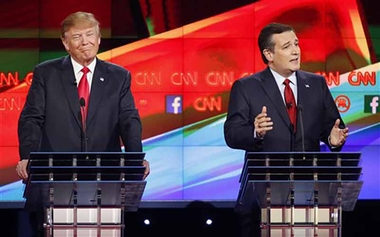Cruz looks to Super Tuesday for advantage in GOP nomination

ATLANTA (AP) — Less than two months before voters in Iowa and New Hampshire start winnowing the field of Republican presidential hopefuls, Texas Sen. Ted Cruz isn't ready to hunker down in those historically influential states just yet.
Instead, he's redirecting his burgeoning campaign toward a band of March primary states he believes can propel him to the GOP nomination.
On the heels of his newfound lead in a key Iowa poll, his itinerary demonstrates some combination of confidence and risk — and it offers a contrast with rivals who must focus on the two early states as they try to prove their staying power.
While Jeb Bush and Chris Christie conduct as many New Hampshire town hall meetings as possible, Cruz will travel on a chartered jet through seven states that vote on March 1 — Super Tuesday — concentrating on several Southern states where Cruz is particularly popular among conservatives. The itinerary includes Minnesota, Virginia, Georgia, Alabama, Tennessee, Arkansas and Oklahoma.
Cruz's trip is driven in part by simple math, since the Super Tuesday states offer a trove of delegates that will be required to win the nomination at the party's mid-July convention in Cleveland. The "Take Off with Ted" tour is the latest in his effort to become the consensus choice of anti-establishment but socially conservative Republican voters who are disillusioned about the nation's course and the GOP's seeming inability to redirect it.
Cruz and his aides predict his strategy will resonate with voters in the March primary states, particularly those where conservative majorities have long been defined by a visceral distrust of Washington, including GOP brass.
Chad Sweet, the Cruz campaign's chairman, described this portion of the campaign as "our Southern firewall strategy."
For all his bullishness, Cruz will not have the Southern states or the rest of the Super Tuesday lineup to himself, even if he manages to win or perform well in Iowa and South Carolina. Among establishment favorites, Jeb Bush says he has the resources to last into March. Marco Rubio's campaign still believes he can appeal across the divide between tea party conservatives and the establishment. And of course there's Donald Trump, the leader in national polls.
Cruz's strategy, developed well before Trump shot to the lead, is to appeal to frustrated conservatives by emphasizing his roots as a tea-party, grassroots-friendly firebrand. The Cruz campaign says it is complementing that approach with intense state-by-state organizing — somewhat mimicking President Barack Obama's neighborhood-based approach to campaigning eight years ago — with local tea party leaders playing a pivotal role.
His campaign boasts of having leaders in every county in the first four voting states of South Carolina, Nevada, Iowa and New Hampshire. It also claims to have leaders in all 153 congressional districts in the 24 states that have primaries before March 15, according to spokeswoman Catherine Frazier.
Super Tuesday has 565 bound delegates — convention goers the party says are obligated to vote in line with their state's primary or caucus results — at stake in a race that requires 1,236 for the nomination. The states on Cruz's tour have more than 330 — a number that does not count the 152 delegates available in the senator's home state of Texas, which also votes March 1.
The nomination won't be won in the first two weeks of March, since states voting before March 15 will distribute their delegates proportionally instead of in a winner-take-all fashion. But Cruz is betting that he can leverage his recent surge in the polls with his traditional, broad appeal to conservatives to give him a sustainable one-two punch that no other Republican can match.
On previous visits to some of the March primary states, Cruz has told voters their job is "to make sure that the next Republican nominee for president is a real and genuine conservative." He generally doesn't mention his opponents, instead recalling past Republican nominees like Bob Dole, John McCain and Mitt Romney, who failed to win the presidency — figures many self-declared conservatives deem too moderate for the GOP of 2016.
"If we nominate Democrat-lite, we will lose once again," Cruz said.
In Alabama, one of his lead organizers, Becky Gerritson, said the message resonates across multiple "lanes" in the party, the term Cruz himself uses to talk about the various groupings of Republican voters.
"A lot of people in the establishment hate him," said Gerritson, a local tea party leader. "But he's attracting constitutional conservatives ... people who love the Second Amendment. I see a lot evangelical support. ... And I think even some people who consider themselves establishment are starting to give him a second look."
A Nashville tea party leader and Cruz supporter, Ben Cunningham, said the senator's efforts in Tennessee, another stop on his tour, far outpaced other candidates.
In one example, Cruz supporters have been passing out campaign literature at most of the Christmas parades that are common in small towns across Tennessee leading up to the holiday, while other campaigns are absent, Cunningham said.
"It's typical of the kind of opportunistic grassroots campaign that's taking place, under the radar many times," said Cunningham. "There are a lot of people who talk about grassroots campaigns, but there aren't that many that can capture and use the energy of the grassroots."
Bill Barrow. Scott Bauer. Copyright 2015 The Associated Press. All rights reserved. This material may not be published, broadcast, rewritten or redistributed.
The Gayly - 12/17/2015 @ 11:27 a.m. CST





